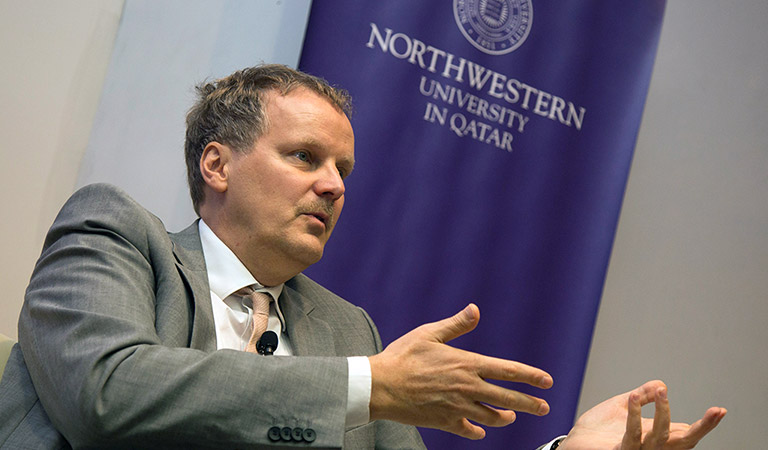Andrei Richter, one of the world’s leading authorities on media law and censorship, spoke on the global challenges for freedom of expression at Northwestern University in Qatar.
Richter, a longtime professor of journalism at Moscow State University, Russia’s premier media school, and currently a senior advisor and formerly director of the Organization for Security and Cooperation in Europe (OSCE) Representative on Freedom of the Press in Vienna, shared his thoughts and expertise on some of the major obstacles that hinder media freedom around the world, including self-censorship, discrimination, and the penalization of journalists for slander and libel.
“Dr. Richter is one of the foremost professionals on global media freedom. His work on the development and regulation of media law has been published in Russian, English, Armenian, Azeri, Ukrainian, Serbian, Slovakian, German and French. He is committed to protecting the freedom of press, and pushes boundaries to bring governments to recognize and resolve related issues,” said Everette E. Dennis, dean and CEO.
In his discussion with students and faculty at NU-Q, Richter commented on the rise of the digital age as having both positive and negative implications on media. “We lost a bit of the value media had in previous times, but we also gained a lot with access to endless amounts of information, as well as breaking news and event updates as they happen,” he said.
He also noted the unique role NU-Q plays in the region. “I was very pleased to learn that NU-Q teaches its students about media law and ethics. Knowing their rights as journalists and communicators will help them understand how the system works, and how to protect themselves from law infringement accusations,” said Richter.
The OSCE, where Richter is currently a senior advisor, is a 57-nation security organization that includes Europe, Central Asia, and North America. The office of Representative on Press Freedom observes media developments to assure that member nations abide by their commitments to freedom of expression and free media, as well as efforts on the safety of journalists, media pluralism, decriminalization of defamation, combating hate speech, and promoting internet freedom. Richter has been active in research efforts, reports, and publications at OSCE as well as organizing problem-solving conferences.
Richter was born in Kharkov, Ukraine, and holds university degrees in law and foreign languages and a doctorate in mass communication. He completed his Ph.D. at Moscow State University near the end of the Cold War and became a leading scholar and spokesperson during and after the Glasnost reforms. He was often quoted in the Western media, including The New York Times while writing op-eds for The Guardian and other outlets.

